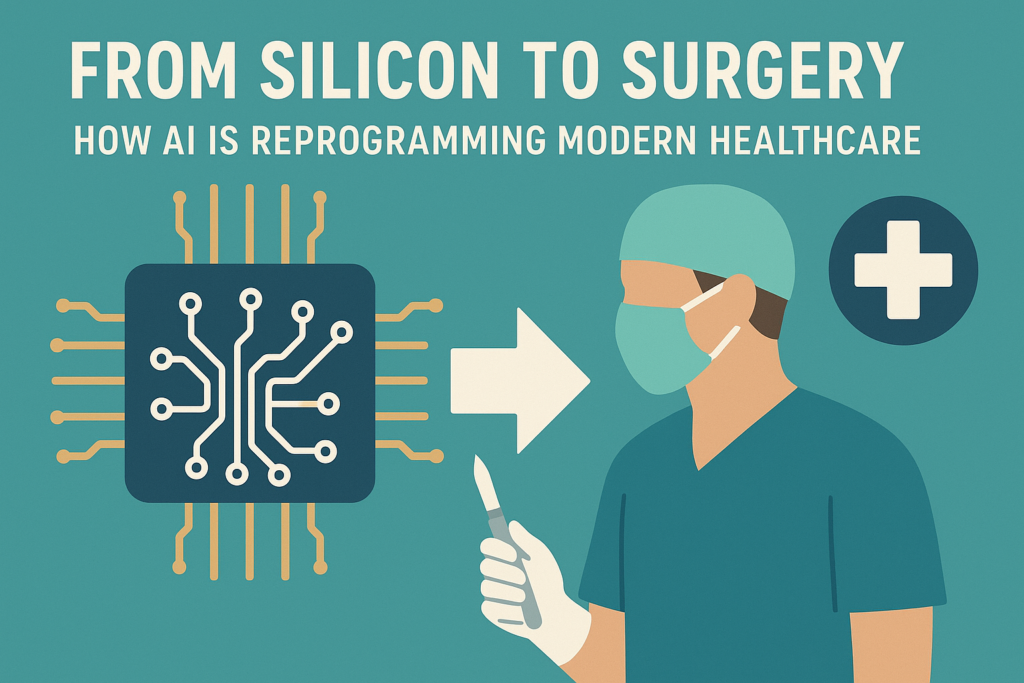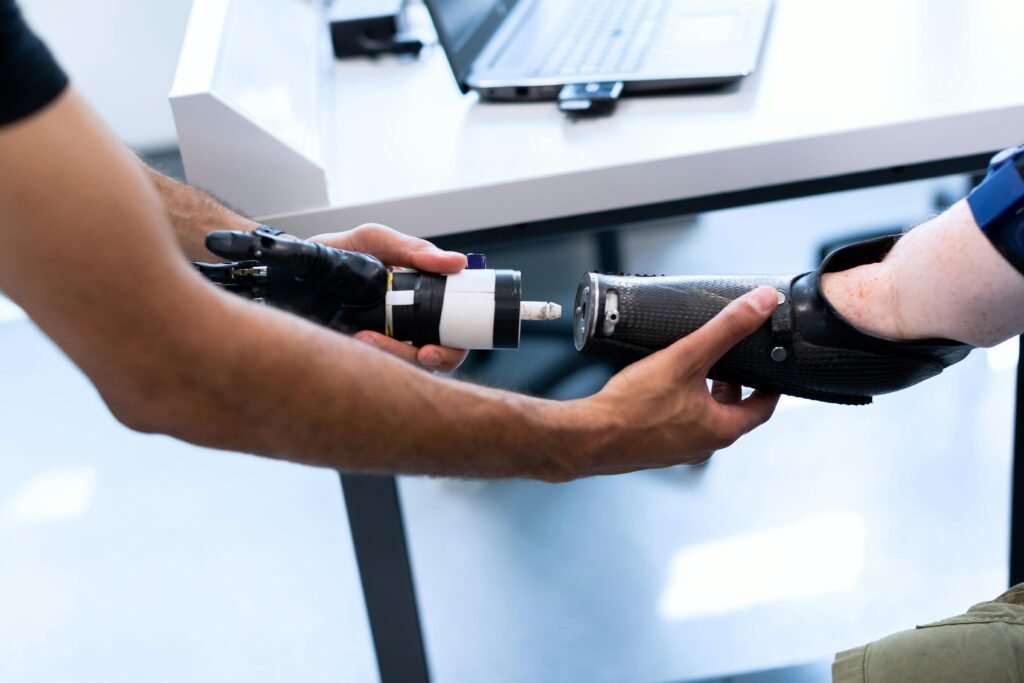
- From Silicon to Surgery: How AI Is Reprogramming Modern Healthcare
- 1. AI in Medical Diagnostics: Seeing Beyond Human Eyes
- 2. Robotic Surgery: Where Silicon Meets Scalpel
- 3. Personalized Treatment Plans: Precision Medicine with AI
- 4. Virtual Health Assistants & Chatbots: AI at the Frontline
- 5. Drug Discovery & Clinical Trials: Speeding Up Science with AI
- 6. Remote Patient Monitoring: AI Beyond the Hospital Walls
- 7. Challenges and Ethical Considerations in AI Healthcare
- 8. The Future of AI in Healthcare: What’s Next?
- AIX Circle’s Role in Reprogramming Global Healthcare
- Final Thoughts
From Silicon to Surgery: How AI Is Reprogramming Modern Healthcare
A deep dive into how artificial intelligence is reshaping diagnostics, robotic surgery, and personalized treatment plans across global hospitals.
In an age where technology touches every corner of human existence, perhaps no space is being transformed as profoundly—or as urgently—as healthcare. From early diagnosis to precision surgery and individualized treatment, artificial intelligence (AI) is moving rapidly from the realm of silicon chips into the hands of surgeons and clinicians. This is not just a technological evolution; it’s a paradigm shift in how we approach human health and medicine.
Welcome to a world where algorithms help detect disease faster than doctors, surgical robots perform procedures with millimeter precision, and patient care is tailored based on predictive models trained on vast datasets. This is the frontier of AI in healthcare—and it’s changing everything.
1. AI in Medical Diagnostics: Seeing Beyond Human Eyes
Perhaps the most immediate and celebrated application of AI in modern healthcare is its unparalleled diagnostic capability.
With the explosion of medical data—CT scans, MRIs, X-rays, genetic profiles—machine learning models have been trained to identify patterns and anomalies that might escape even the most experienced human eyes.
Key AI Diagnostic Applications:
- Radiology: Deep learning models like Google’s DeepMind have achieved superhuman accuracy in detecting breast cancer, often outperforming radiologists.
- Dermatology: AI apps now allow users to scan suspicious moles or lesions with smartphones, offering instant risk assessments for conditions like melanoma.
- Ophthalmology: AI is diagnosing diabetic retinopathy and glaucoma with high accuracy, making early intervention possible in underserved regions.
These models analyze images using convolutional neural networks (CNNs), which simulate the way the human brain processes visual data. Once trained, these AI systems can review thousands of images in minutes, offering real-time diagnosis support and drastically reducing the time to treatment.
Keyword Insight: AI in medical diagnostics, machine learning healthcare, AI image analysis in radiology
2. Robotic Surgery: Where Silicon Meets Scalpel
Once a vision of sci-fi, robot-assisted surgery is now a real-world marvel. Powered by AI algorithms, robotic systems like the da Vinci Surgical System are enabling surgeons to perform highly delicate procedures with greater precision, control, and fewer complications.
Benefits of AI-Powered Robotic Surgery:
- Smaller incisions and faster recovery times
- Minimized human tremor and enhanced motor control
- Augmented reality overlays for real-time anatomical guidance
- Predictive AI models that adjust intra-operative strategies on the fly
These surgical robots use AI to learn from past surgeries, improving performance over time. Some systems even provide haptic feedback, allowing surgeons to “feel” tissues remotely while the AI safeguards against accidental damage.
In the future, AI-driven surgical robots might be able to conduct certain procedures autonomously, under human supervision—especially in remote or emergency environments.
Keyword Insight: AI in surgery, robotic surgical systems, machine learning in operating rooms
3. Personalized Treatment Plans: Precision Medicine with AI
Gone are the days of one-size-fits-all treatment. Today, AI and data science are enabling the rise of precision medicine—where therapies are tailored based on a person’s unique genetic makeup, lifestyle, environment, and history.
How AI Enables Personalized Healthcare:
- Genomic Analysis: AI algorithms analyze entire genetic sequences to identify disease markers or drug sensitivities.
- Electronic Health Records (EHR): AI mines patient histories to recommend optimal treatments and predict complications.
- Predictive Models: AI forecasts disease progression (e.g., cancer or diabetes) based on a mix of biometric and behavioral data.
For example, IBM’s Watson for Oncology analyzes clinical trials, medical literature, and patient records to recommend personalized cancer treatment options—sometimes suggesting novel approaches even seasoned doctors hadn’t considered.
Keyword Insight: AI personalized medicine, predictive healthcare AI, machine learning in treatment planning
4. Virtual Health Assistants & Chatbots: AI at the Frontline
The doctor’s office is no longer the first place many people turn for healthcare. Thanks to AI-powered virtual assistants and medical chatbots, patients can now access triage, symptom analysis, and mental health support right from their smartphones.
Capabilities of AI Health Assistants:
- Symptom Checkers: AI chatbots like Ada and Babylon assess symptoms and suggest next steps.
- Mental Health: Apps like Woebot use natural language processing (NLP) to deliver cognitive behavioral therapy (CBT) techniques through conversation.
- Post-Op Monitoring: AI tools follow up with patients after discharge, improving compliance and reducing hospital readmissions.
With access to 24/7 intelligent assistance, patients are empowered, healthcare systems are less burdened, and early detection becomes more accessible.
Keyword Insight: AI healthcare chatbot, virtual health assistant AI, NLP in healthcare
5. Drug Discovery & Clinical Trials: Speeding Up Science with AI
Traditionally, drug development takes 10–15 years and billions of dollars. AI is radically shortening this timeline by simulating chemical reactions, screening molecular compounds, and even predicting trial outcomes.
Where AI Is Making a Difference:
- Molecular Modeling: AI models like AlphaFold are solving protein folding—unlocking potential for new drug targets.
- Trial Recruitment: Machine learning helps match patients with trials based on their genomic and health profiles.
- Side Effect Prediction: AI can anticipate adverse drug reactions before trials begin.
During the COVID-19 pandemic, companies like BenevolentAI and Insilico Medicine used AI to identify existing drugs that might be repurposed to fight the virus, illustrating AI’s value in crisis response.
Keyword Insight: AI in drug discovery, machine learning clinical trials, pharmaceutical AI innovation
6. Remote Patient Monitoring: AI Beyond the Hospital Walls
In an increasingly mobile world, AI-powered remote monitoring systems are keeping patients safe and healthcare proactive.
Using IoT sensors and wearable devices like smartwatches or fitness trackers, AI collects and analyzes data such as:
- Heart rate variability
- Blood oxygen levels
- Glucose monitoring
- Sleep and activity patterns
Combined with AI, these tools generate real-time alerts for abnormalities, helping clinicians intervene before conditions worsen. For chronic diseases like hypertension or diabetes, this is a game changer.
Keyword Insight: AI remote patient monitoring, healthcare wearables AI, predictive health alerts
7. Challenges and Ethical Considerations in AI Healthcare
With great power comes great responsibility. As AI embeds itself deeper into healthcare, several concerns must be addressed:
- Bias in AI models can lead to disparities in care—especially for underrepresented populations.
- Data privacy and patient consent are ongoing concerns with health data collection.
- Lack of transparency (black-box AI) in clinical decision-making creates trust issues.
It’s crucial that AI healthcare systems are built with accountability, explainability, and inclusivity at their core. Regulations like HIPAA and the EU’s AI Act are beginning to establish ethical frameworks, but more collaboration is needed between technologists, clinicians, and policymakers.
8. The Future of AI in Healthcare: What’s Next?
The intersection of AI and healthcare is still in its early stages. Over the next decade, we can expect:
- Hyper-personalized treatments driven by continuous data streams and AI models.
- AI-assisted robotic microsurgery for neurology and cardiology.
- Digital twins of patients, enabling risk-free testing of treatments in virtual environments.
- AI-powered hospitals, where patient flow, inventory, and staff scheduling are optimized in real time.
By 2035, the World Health Organization predicts that AI could save up to $150 billion annually in the U.S. alone through efficiencies in healthcare delivery.
AIX Circle’s Role in Reprogramming Global Healthcare
At AIX Circle, we believe the convergence of silicon and surgery is not science fiction—it’s today’s imperative. Our mission is to accelerate this transformation by fostering AI research, development, and deployment across health ecosystems.
We collaborate with:
- Medical research institutions
- Healthcare startups and enterprises
- Policy-makers and data scientists
Our goal is to create a transparent, responsible, and truly intelligent AI infrastructure that doesn’t just treat illness but promotes holistic, lifelong well-being.
Final Thoughts
From diagnostics to the operating room, from hospital beds to home monitoring, AI is reprogramming modern healthcare at every level. The convergence of machine learning, robotics, and big data analytics is enabling a smarter, safer, and more efficient global health system.
This isn’t just a technological revolution—it’s a human one. A world where care is timely, treatments are tailored, and lives are saved through insight, not just intervention.
📌 Want to stay ahead in the AI-healthcare revolution?
Join AIX Circle to explore how artificial intelligence can unlock new possibilities for medicine, innovation, and the future of care.

